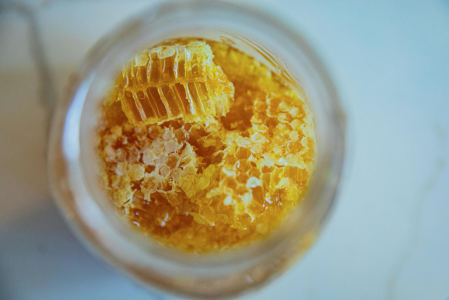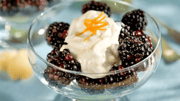Is it safe to eat honeycomb? Here's what you need to know
By
Aubrey Razon
- Replies 0
Natural foods are more popular than ever, and honeycomb is catching attention for its unique appeal. This sweet treat, crafted by bees, offers something special for those craving a new addition to their diet.
But before you dive in, should you be cautious about eating it?
Honeycomb is the beautiful, geometric masterpiece that bees create to store their honey and nurture their young.
It's a natural product that's as fascinating to look at as it is to eat.
Many people enjoy honeycomb for its raw, unfiltered honey, which is believed to retain more nutrients and enzymes than its processed counterpart.
The comb itself, made of beeswax, is also edible and offers a unique textural experience.

Shelley Balls, a registered dietitian and nutritionist, highlights the appeal of honeycomb for those avoiding processed sugars.
It can be a delightful addition to various foods, from cheese boards to yogurt, providing a chewy contrast and a burst of floral sweetness.
Nutrition experts often praise honeycomb for its potential health benefits.
It's packed with antioxidants, enzymes, and polyphenols, which are linked to a reduced risk of chronic diseases, including cancer.
Trista Best, a registered dietitian, points out that honeycomb may aid digestion, bolster immune health, and help combat inflammation.
However, despite these benefits, honeycomb isn't suitable for everyone.
The high sugar content can be a concern for individuals with diabetes or those monitoring their sugar intake.
Moreover, there are specific groups who should steer clear of honeycomb altogether.
The first group includes those with allergies to pollen or bee-related products.
If you're allergic to bees or have had reactions to bee stings or pollen, consuming honeycomb could trigger an allergic response.
Infants under one year of age are another group that should not consume honeycomb.
The risk of infant botulism, a rare but serious condition, arises from the bacteria sometimes present in honey.
Babies' digestive systems are not mature enough to handle these bacteria, which can lead to severe illness.
Additionally, individuals with compromised immune systems should exercise caution.
While the antibacterial properties of honey are often celebrated, the risk of exposure to botulinum spores, albeit low, is still present in raw honeycomb.
For those who can safely enjoy honeycomb, moderation is key.
Treat it as a delicacy rather than a staple, savoring small amounts to minimize sugar intake.
When introducing honeycomb into your diet, start with a small piece to ensure you don't have an adverse reaction, especially if you're unsure about potential allergies.
If you've determined that honeycomb is safe for you to consume, there are many creative ways to enjoy it.
Spread a piece on warm toast to let the honey melt into the bread, or pair it with sharp cheeses for a delightful contrast of flavors.
You can also chop it into small pieces and sprinkle it over oatmeal or a bowl of fresh fruit for added texture and sweetness.
Honeycomb is a natural treat that can offer health benefits and culinary enjoyment.
However, it's not without its risks, and certain individuals should avoid it.
Always consider your health conditions and consult with a healthcare provider if you're unsure whether honeycomb is safe for you.
 Have you tried honeycomb before? Do you have any favorite ways to enjoy it, or concerns about its health implications? Share your experiences and thoughts in the comments below.
Have you tried honeycomb before? Do you have any favorite ways to enjoy it, or concerns about its health implications? Share your experiences and thoughts in the comments below.
But before you dive in, should you be cautious about eating it?
Honeycomb is the beautiful, geometric masterpiece that bees create to store their honey and nurture their young.
It's a natural product that's as fascinating to look at as it is to eat.
Many people enjoy honeycomb for its raw, unfiltered honey, which is believed to retain more nutrients and enzymes than its processed counterpart.
The comb itself, made of beeswax, is also edible and offers a unique textural experience.

Honeycomb is considered a nutritious and tasty treat, offering a chewy and waxy texture and a sweet, floral taste. Image source: Ekaterina Belinskaya/Pexels.
Shelley Balls, a registered dietitian and nutritionist, highlights the appeal of honeycomb for those avoiding processed sugars.
It can be a delightful addition to various foods, from cheese boards to yogurt, providing a chewy contrast and a burst of floral sweetness.
Nutrition experts often praise honeycomb for its potential health benefits.
It's packed with antioxidants, enzymes, and polyphenols, which are linked to a reduced risk of chronic diseases, including cancer.
Trista Best, a registered dietitian, points out that honeycomb may aid digestion, bolster immune health, and help combat inflammation.
However, despite these benefits, honeycomb isn't suitable for everyone.
The high sugar content can be a concern for individuals with diabetes or those monitoring their sugar intake.
Moreover, there are specific groups who should steer clear of honeycomb altogether.
The first group includes those with allergies to pollen or bee-related products.
If you're allergic to bees or have had reactions to bee stings or pollen, consuming honeycomb could trigger an allergic response.
Infants under one year of age are another group that should not consume honeycomb.
The risk of infant botulism, a rare but serious condition, arises from the bacteria sometimes present in honey.
Babies' digestive systems are not mature enough to handle these bacteria, which can lead to severe illness.
Additionally, individuals with compromised immune systems should exercise caution.
While the antibacterial properties of honey are often celebrated, the risk of exposure to botulinum spores, albeit low, is still present in raw honeycomb.
For those who can safely enjoy honeycomb, moderation is key.
Treat it as a delicacy rather than a staple, savoring small amounts to minimize sugar intake.
When introducing honeycomb into your diet, start with a small piece to ensure you don't have an adverse reaction, especially if you're unsure about potential allergies.
If you've determined that honeycomb is safe for you to consume, there are many creative ways to enjoy it.
Spread a piece on warm toast to let the honey melt into the bread, or pair it with sharp cheeses for a delightful contrast of flavors.
You can also chop it into small pieces and sprinkle it over oatmeal or a bowl of fresh fruit for added texture and sweetness.
Honeycomb is a natural treat that can offer health benefits and culinary enjoyment.
However, it's not without its risks, and certain individuals should avoid it.
Always consider your health conditions and consult with a healthcare provider if you're unsure whether honeycomb is safe for you.
Key Takeaways
- Honeycomb is considered a nutritious and tasty treat, offering a chewy and waxy texture and a sweet, floral taste.
- It contains beneficial antioxidants, enzymes, and nutrients like polyphenols, which may have health benefits such as reducing the risk of illness and supporting digestion and immune health.
- People with allergies to pollen or other bee products should avoid eating honeycomb, and it is not suitable for children under one due to the risk of infant botulism.
- Those with diabetes or conditions that require sugar restrictions should take into account the high sugar content of honeycomb when considering consumption.






